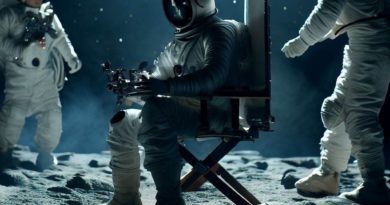In a Tweet, Fox News Seems to Question the Moon Landing
Fox News anchors sometimes remind viewers that: We report. You decide.
The company took an especially broad outlook on what kind of information merited a decision on Monday, when it appeared to question the reality of the Apollo missions and the moon landing.
“You be the judge: Skeptics say picture debunks moon landing,” the network tweeted. The accompanying story cited an anonymous YouTube conspiracy theorist’s video that claimed to show discrepancies in a photo from the Apollo 17 mission. The story does not have a byline. A spokeswoman for the network did not respond to a request for comment about whether it considers the moon landing up for debate.
By the afternoon, the story had also made it on the front page of Google News. Newsweek and The Daily Mail also amplified the conspiracy theory.
The story may seem like a giant leap for Fox in terms of what sources it deems newsworthy. The network—whose reporters have questioned the existence of climate change and advanced sketchily sourced conspiracy theories—has given airtime to many viewpoints that challenge the established evidence in the past. But even so, the fact that NASA went to the moon is a particularly strange story to pick up. The Apollo landing sites are not only a product of American scientific and technological leadership; they’re also an easily confirmable fact. Probes from Japan, China, and India have all seen the landing sites, as have later NASA missions. A preponderance of evidence from the period also testifies to the reality of the landing.
But questioning the veracity of the moon landing in particular is not actually a new exercise for television journalists. In 2001, an hour-long special aired on Fox that questioned whether the moon landings were fake. Fox News has hosted a moon-landing conspiracist at least twice since that year. Not to be outdone, CNN covered Bart Sibrel, the same conspiracy theorist who produced the Fox documentary, in an online story in 2009, as well as NASA’s response to the Fox documentary in 2001.
And The New York Times covered Sibrel as well as other conspiracy theorists in 2009—though it also added that polls suggested only 6 percent of Americans believed the rumors.
One of those Americans—as it happens—is Roger Stone, a confidante of President Trump’s who once insisted (or perhaps joked) that the moon landing was fake.
Likely the Fox News tweet achieved such stardom because it darkened journalists’ timelines on the waning hours of a preholiday Monday. It seemed to confirm that Fox occasionally caters to the fringe. But the same network also amplified a poorly sourced conspiracy theory about Seth Rich, a murdered Democratic staffer, for weeks, before suddenly abandoning the story. Other journalists from the network have misreported stories about climate change and asked how global warming can be real if it also sometimes snows. Which coverage is more harmful? We report, you decide.
We want to hear what you think about this article. Submit a letter to the editor or write to letters@theatlantic.com.
*** This article has been archived for your research. The original version from The Atlantic can be found here ***



